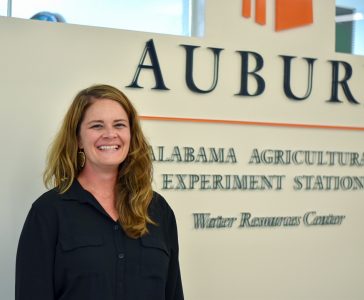Post contributed by Ingrid Schnader, Office of Sustainability Intern
When it comes to watershed issues, it can be difficult to get the surrounding community to care. Mona Dominguez takes a different approach with the Alabama Water Watch (AWW): this volunteer water-quality monitoring program gets people of all ages outside and into the water to collect data and have fun doing it.
The program started in 1992 as part of the Auburn Water Resources Center, about 20 years after the Clean Water Act was instated. Instead of making laws that regulate non-point source pollution, volunteer water monitoring educates people and benefits the whole state.

Mona Dominguez poses in front of the Alabama Agriculture Experiment Station.
“This is a good way to educate people, but also we recognize that we really need to have good data about our state’s water and resources,” Dominguez says. “Typically our [state’s] environmental management organization is underfunded, and we have a lot of water.”
Dominguez also strives to empower citizens with this program. Instead of letting volunteers collect samples of water to be sent off to a lab, AWW encourages citizens to be more independent. The volunteers use AWW approved methods to collect data in the field, and enter the data entries online themselves, which then can be accessed by anyone.
Although Dominguez has worked with AWW for almost a decade, she says she didn’t study any science-related fields in college. “You don’t need to have that kind of background,” she says. “And even if you do, you can keep learning through it. Every time you go out, you never know what you’re going to find and what you’ll have to investigate.”
For the past four years, Dominguez’s main project has been the youth program that has a partnership with Alabama 4-H. “We need kids who are growing up understanding different aspects of their watersheds and what pollutes our water quality,” she says. This hands-on classroom teaches students how to do the monitoring and exposes them to these concepts at an early age.
The program is for youth who are 9 to 18 years old, but most of the water monitoring is done by students in middle or high school. Because of their flexible curriculum, Dominguez says educators can make it work for their students even when they are younger.
In addition to coordinating the youth program, Dominguez spends time volunteering for the water watch program. She began doing this when she was still a graduate student at Auburn studying community planning. She says she was never bored because every day was different.
“I love working with people, I love water, and I love the environment,” Dominguez says. But her favorite part isn’t just getting out in the streams. “That is awesome, but really the people who volunteer with us are just some of the best people you’d ever meet.”
Dominguez has a message for students who consider getting involved with this program. “This is a great time to get involved. … You’re doing something that’s going to be valuable to the state for years to come,” she says. “If you think you might be interested in working in some sort of natural resources, this is a great way to explore that and get a feel for if you like doing fieldwork or data analysis. If you really like teaching, this is a way to do that, too.”
You can visit the AWW website to find out more information about water data around Alabama. Going to this website will also show you how to get involved and earn your certification in water monitoring.




